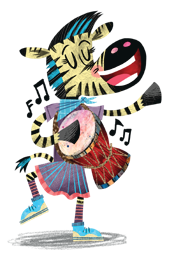Psalms
2:10–12
Find the words that tell you how the king should serve the Lord.
Write them down. How does someone feel who serves the Lord like this?
Choose a color on Hearty’s color chart on page 19 that shows their feelings.
What did David mean when he said we should celebrate his rule with trembling?
We must respect the Lord.
We need to remember that he is almighty and has power over all things.
3 – 4
Hearty read these two psalms. In them, David explains why he sleeps well even though he has many enemies.
- What reason does David give in Psalm 3:5-6?
- What reason does David give in Psalm 4:8?
Are you sometimes afraid at night? What do you do when you are afraid?
Try saying the words of these psalms when you are afraid at night. The words are true. Remember them!
9:1–3
David liked to tell people what the Lord had done for him. How did he feel when he thought about those things?
Find a piece of paper to write on or use your notebook. Write down five things that the Lord has done for you and your family. How do you feel when you think about those things? Write your thoughts here. Then look at Hearty’s color chart on page 19.
Find the colors of your feelings. Then use crayons or colored pencils to lightly color over your words.
23:1–4
Read this psalm with Hearty. Then think of the Lord as your shepherd.
- How does he protect and care for you?
- What does he do for you?
- What does he give you?
How do you feel when you remember that the Lord is always with you?
Choose a color from Hearty’s color chart on page 19.
You can read more about the good shepherd in John 10:1–15.
30:11–12
When people were sad in those days, everyone could see it.
They wore special clothes made from rough material that scraped against their skin.
They put ashes on their heads. Sometimes they cried loudly.
When their time of sadness was past, they took off their clothes of sadness.
Then everyone knew they were feeling better.
31:14–16
David said that his whole life was in God’s hands.
Think about some important dates and events of your life so far. Make a timeline of these things. Draw a line across the middle of a piece of paper. Then along the line, show the important days and events in your life.
For example, write down what happened on a special birthday or holiday.
Above the timeline you can write these words, My life is in your hands.
Then decorate your paper.
Crafty says why not explain to someone who’s younger than you what those words mean.
32:3–7
Inny knows that it’s difficult to admit you were wrong. It’s easier to pretend that you don’t care and that everything is fine.
What happened to the person who kept quiet about his sin? Read about him in verse 3.
What happened when he admitted his sin to the Lord? Find the answer in verse 5.
What do you think is the best thing to do?
The advice in this psalm isn’t easy to follow but it’s important.
42:1
The Sons of Korah were Levites. Their father, Korah, was a Levite who lived in the time of Moses. In the desert, he rebelled against Moses.
Read Numbers 16:1–2.
However, the people from Korah’s family line served the Lord faithfully. They served in the holy tent.
Samuel was from the family line of Korah.
Some of Korah’s other family members were also among David’s band of warriors.
Read 1 Chronicles 6:22–27.
Another group from Korah’s family line were in charge of the music in the temple.
They wrote some very beautiful psalms.
42
How did the writer of this psalm feel?
Hearty suggests you get a piece of paper. Write on it the words that the psalm writer used to describe his feelings.
Choose colors from Hearty’s color chart on page 19 that show those feelings.
Then use crayons or colored pencils to lightly color over the words you wrote.
Then read verse 11 to find out how the psalm writer wanted to feel.
Turn your paper over and write on that side what the writer wanted to do.
Then using colors that show those feelings, color lightly over those words.
Now take time to read the words you wrote and look at the colors.
Do they say and show how you feel and what you want to do?
47 – 48
Psalms 47 – 48 are sometimes called songs of Zion.
They are about the temple that was built on Mount Zion by Solomon.
They are also about the city of Jerusalem that was also built on Mount Zion by David.
These psalms are about the house of the Lord. They are about the joy felt by the people who visit God’s house.
51:3–12
Crafty has something for you to do when you’ve read these verses.
Find something that’s very, very dirty and clean it.
For example, you can wash the dishes.
David is sad about his sins. He feels like something that has become very dirty and needs to be cleaned.
We must tell the Lord about our sins. We must ask the Lord to forgive the things we do wrong. He always forgives us. He washes us and makes us clean.
Repeat verse 7 every time you clean something.
Then you will get to know this verse by heart.
60:9–12
In those days, kings went to fight against one another.
They believed that the king with the strongest gods would win the battle.
But David knew that God has all the power!
He knew that God had promised to help them win their battles.
We sometimes think that evil is stronger than God.
But David knew, and we know, that isn’t true!
77
Hearty sometimes feels all alone and forgotten. Sometimes he feels like no one even notices him. Do you ever feel that way?
Read this psalm and find out how Asaph felt. He felt like even God had forgotten about him.
So what did he do when he felt like that? He thought about everything the Lord had done for him in the past.
You can do the same thing. Think of all the things that the Lord has done for you and your family.
And don’t forget the most important of all! You are God’s child and he cares for you.
78
Asaph wrote this very long psalm for the Israelites and especially the young people.
He wanted them to remember God’s covenant with them.
And he wanted them to remember what the Lord had done for them.
But the people didn’t keep their covenant with the Lord and turned away from him.
In verses 36–37 as well as 40–41, we read that this made the Lord sad and angry.
And he punished them. But in verses 38–39, we read that the Lord is merciful and forgave the people’s sins.
This psalm is also for us. It reminds us that God is merciful and also forgives us our sins.
84:1–8
Crafty wondered if you’ve ever watered a plant with wilted leaves.
What happened to the plant after a while?
You can do this for people too. Psalm 84 tells us what kind of a person cares for others.
Verses 4–5 say it’s a person who regularly worships the Lord, and it’s those people whose strength comes from the Lord. Verse 6 says they are like people who water wilted plants. They give hope to people who are discouraged. They make grumpy people smile. They make sad people laugh.
The Lord’s strength flows from them to other people.
91:1–4
This psalm contains many wonderful promises about God’s love. Arty has a good idea: Write down all the things that the Lord protects us against. Then make a drawing of one of these.
- The Lord is like a fort in which you hide. (Read verse 2.)
- Or draw how you can hide under his wings. (Read the first part of verse 4.)
- Or draw how the Lord keeps you safe like a shield or a tower. (Read the last part of verse 4.)
Put your drawing in your pocket and look at it often.
103:1–13
David sings about the Lord and about his greatness. Choose a verse that tells you something about the Lord that you want to remember.
Arty has an idea: Write the words of your verse on a card. Decorate your words. Hang it near your bed. Read the verse every night when you go to bed. Do this until you can say the verse from memory.
104:1–24
This psalm tells us about the wonderful things God made on earth. It tells us the Lord is so great and powerful.
- Verse 2 says he can spread out the heavens like a tent, and it says the sun’s rays are his robe.
- In verse 4, we read that the wind and lightning must obey him.
- Verses 10–18 tell us that this earth, which the Lord has made, is a wonderful place in which to live. Everything on earth has its proper place.
- It also tells us that the Lord looks after everything he created.
105
This psalm tells us about the history of the Israelites. The people didn’t have books. So whenever they gathered at the temple, the Levites told them their history.
They also sang songs about their history because it was easier to remember a song than a story.
The stories and songs all have two main themes:
- God has power over all.
- He is in control of everything that happens.
111:1
Psalms 111, 112, 113, 115, and 117 all have one thing in common: They begin or end with the words Praise the Lord. The Hebrew word for “Praise the Lord” is hallelujah. We often use that word in our songs of praise.
117
There are a lot of interesting things about Psalm 117. It’s the shortest psalm and also the shortest chapter in the Bible. It’s also the middle chapter of the Bible. And this psalm tells us what the whole Bible is about: God’s faithful love.
Thinky likes that many people say the Bible is a letter from God. In this letter that God has written to us, he tells us how much he loves us.
119:9–10
What do you find in verse 9 about the way you should live your life?
What does the writer say at the beginning of verse 1? Those who live in keeping with
the law are blessed. What’s the law? It’s God’s Word. How do we live in keeping with
the law? You have to know it. How do you do that?
You read it!
Inny knows it’s important to find a regular time to read God’s Word. Decide a good
time of day for you to do that. Then read your Bible during that time.
121
Many people know this psalm by heart. Hummy would like to teach it to your group.
Write each verse on a separate piece of paper. Hang the papers next to one another.
Take turns reading a verse out loud. First, do this in groups of three. Then in groups of
two. Finally, do it all on your own.
Take away verse 1. Read the whole psalm together. Who remembered verse 1?
Take away verse 2. Read the whole psalm together. Continue like this until you can
say the whole psalm from memory.
131
Hearty likes to watch a mother pick up her crying baby and rock it. Usually, the
baby soon stops crying. A small child who is hurt or frightened always wants their
mother. These children feel safe and secure in their mothers’ arms.
Read Psalm 131. How does it say we feel when we are with the Lord? We can feel just
as safe and content as a child in its mother’s arms.
How do you feel when you know the Lord keeps you safe and secure?
145:18
How do we know the Lord hears us when we talk to him? After all, we don’t
see him and we don’t hear his voice. Thinky has the answer. She says we have God’s
promise. We can know he hears us. We can know he is ready to help whenever we call
out to him.
Verse 18 says, The Lord is ready to help all those who call out to him.
God is faithful and he keeps his promises to us.













